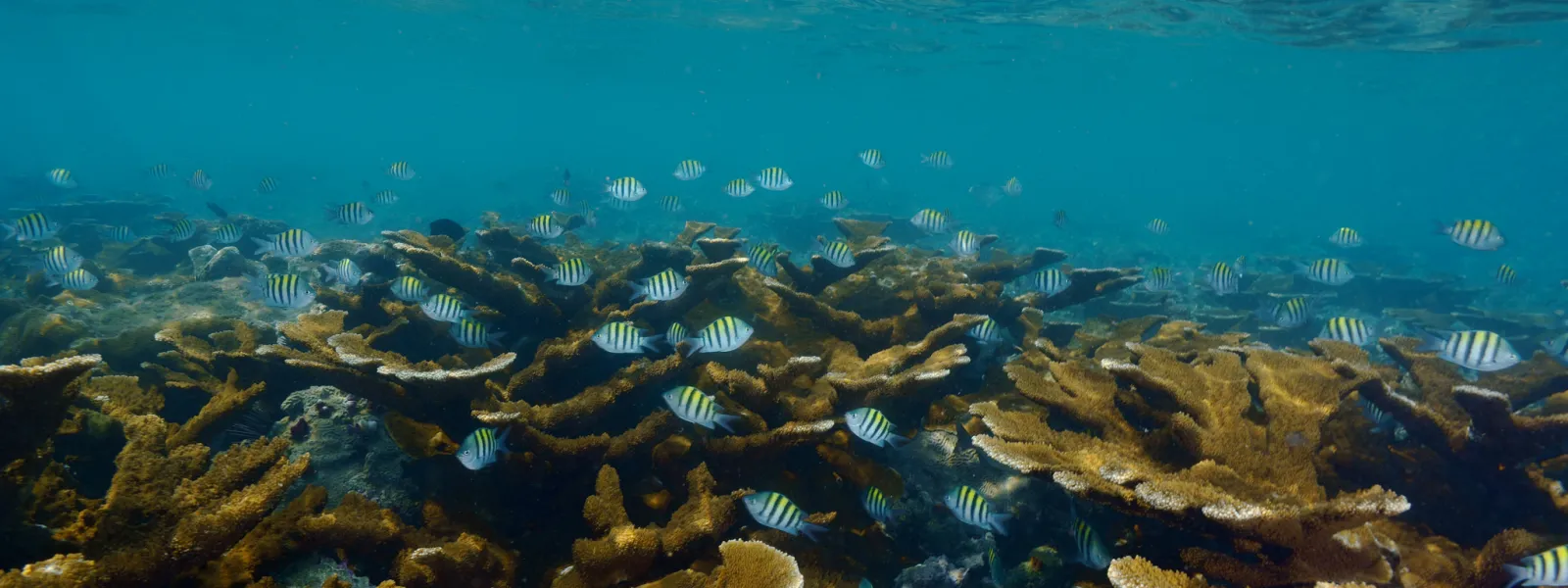
Project
Photo: Manuel VictoriaDefending the Veracruz Reef from a port expansion project
In the Gulf of Mexico, 27 coral reefs form a submarine mountain range running for miles between six islands. Hundreds of colorful fish species, sea urchins, starfish, and sea grasses share the reef with an abundance of other life forms. Fishing, sport diving, and beach tourism thrive along the coast. This is the magnificent Veracruz Reef, the largest coral ecosystem in the Gulf.
In 1992, Mexico’s government declared the Veracruz Reef System a Natural Protected Area. In 2004, it was listed as a Wetland of International Importance under the Ramsar Convention, a treaty for the protection of wetlands including reefs.
Despite the reef’s recognized significance, in 2013 the government reduced the size of the Natural Protected Area and approved a port expansion project. Local communities and organizations challenged the project's environmental permits, demanding protection of the right to a healthy environment.
On February 9, 2022, the Supreme Court of Justice of the Nation unanimously decided that the authorities violated the right to a healthy environment of Veracruz residents by authorizing the port expansion based on a fragmented environmental impact assessment. This means that the permits for the project are non-existent and that the impacts of the project on the health of the reefs must be studied again, this time in a comprehensive manner, and even the viability of the project.
The ruling is a historic precedent not only in Mexico, but for the entire region, as it allows access to environmental justice for the people neighboring an ecosystem affected by a project.
Partners:
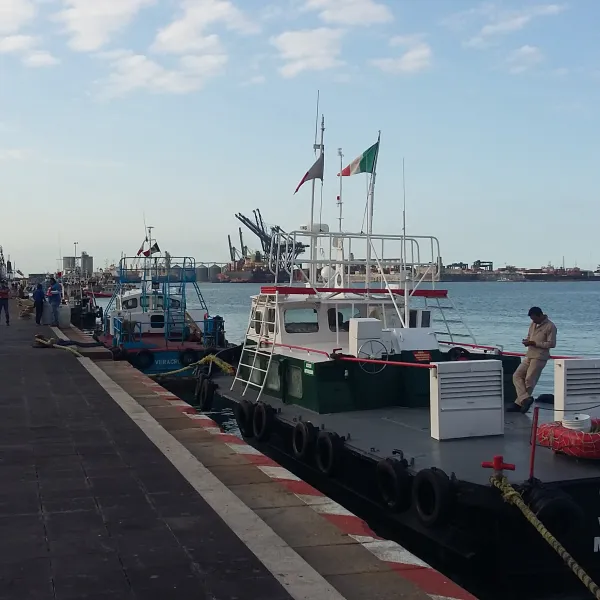
Related projects
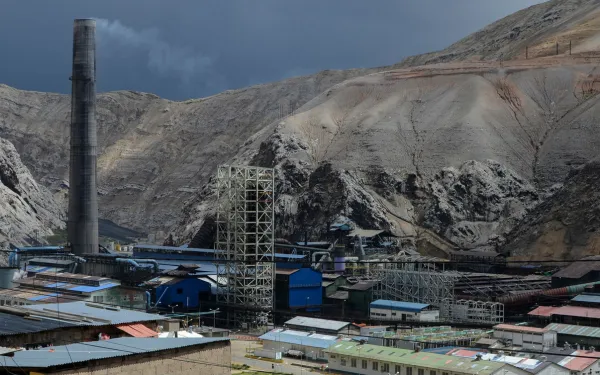
Lowering Peru’s air quality standards is regressive and harmful to public health
The government of Peru has proposed increasing the legal amount of sulfur dioxide in the air by more than 12 times and doubling the allowed level of particulate matter, substances known to cause serious health harms. The proposal ignores both scientific evidence and the government’s obligation to uphold conditions that are suitable for human life and health. Lima, Peru. Peru’s Environment Ministry has proposed new National Environmental Quality Standards for air, which would impact the health of Peruvians everywhere. The proposed standard increases by more than 12 times the limit for airborne concentrations of sulfur dioxide (SO2) and doubles the allowable amount of fine particulate matter. The increased limits ignore scientific evidence that finds these substances can cause lung problems and other illnesses, particularly among the most vulnerable populations such as people with asthma, children, and the elderly. “There is overwhelming scientific evidence to conclude that sulfur dioxide pollution poses a serious health risk, particularly when the contamination reaches high levels over short periods of time, something the proposal does not take into account,” said Anna Cederstav, co-director of the Interamerican Association for Environmental Defense (AIDA). AIDA prepared comments on the proposal that were presented to the government of Peru together with APRODEH. These pointed out that, contrary to the government’s assertion, reducing sulfur dioxide levels in the air would lead to longer life expectancy. This is because, among other reasons, sulfur dioxide also promotes the formation of PM2.5, small particulate matter that lodges in human lungs and causes acute respiratory problems such as bronchitis and pneumonia, as well as premature death. The government proposes to simultaneously double the legal limit for these extremely harmful particles. The organizations also highlighted flaws in the public consultation process. The government published the draft standard on Saturday, April 8, just before the Easter week holiday, giving only 10 working days for public comment on this critical public health issue. They also failed to make public the entire scientific and technical basis for the proposal. In so doing, the government has violated the rights to information and public participation. The comments also emphasize that the government’s proposal violates the American Convention on Human Rights and other international treaties to which Peru is a party, by failing to guarantee the human rights to life and health. While the proposed changes would impact Peru’s entire population, the residents of cities with high levels of pollution, such as La Oroya, would suffer the most severe impacts. La Oroya is an emblematic case because the metallurgical complex operating there—which has for decades been a macro-emitter of pollutants—is in the process of being sold. The government has publically acknowledged that the weakening of the air quality standards is an attempt to promote the sale of the complex. But it ignores the effects those relaxed standards would have on the people of La Oroya, who have seen significant improvements to both their air quality and their health in recent years. People affected by the pollution in La Oroya have sued the State before the Inter-American Commission on Human Rights in an attempt to protect their rights. For ten years, they have been granted precautionary measures due to the risk the pollution poses to their health and life; those measures were recently extended to additional people because the level of risk has continued. “Relaxing air quality standards to facilitate the sale of the complex and increase investment in Peru would be a setback for the protection of health and the environment, which could result in the State being held responsible before the Inter-American Court on Human Rights,” said Christian Huaylinos of APRODEH. “In addition, such actions would violate free trade agreements signed by Peru with the United States and the European Union.” Consult the comments sent to the Environment Ministry of Peru and more information on the case of La Oroya. Press contacts: Rodrigo da Costa Sales, AIDA, [email protected], +51 994767961 Christian Huaylinos, APRODEH, [email protected], +51 959 789 232
Read more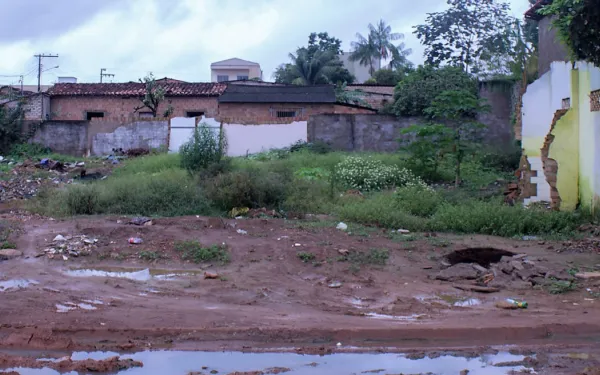
Belo Monte Dam must comply with conditions before continuing operations
Last week a federal court in Brazil suspended the operating license of the Belo Monte Dam. Prosecutors said the dam's operating company, Norte Energía, failed to complete basic sanitation works in the city of Altamira, which has been directly affected by the hydroelectric project. The decision comes in response to a legal appeal filed by the Federal Public Ministry. The sanitation work was a condition for the dam's licensing, authorized by the Brazilian Institute of Environmental Resources (IBAMA), and should have been completed before the reservoir was filled; it was not. "This is the first time that a federal court has suspended one of Belo Monte's suspensão de segurança, a legal tool that guarantees the dam's operation even though it hasn't completed the conditions required under its operating license. In practice, the decision means that the dam must immediately halt all operations, although the completion of pending work may continue," explained AIDA attorney Marcella Ribeiro. "Beyond being an issue of sanitation, this judgment represents an important step forward in the fight to force the operating company to adequately comply with the conditions necessary for the dam's operation, which favor affected communities." "We hope the Brazilian justice system continues to guarantee the protection of the rights of all those affected by the Belo Monte Dam.”
Read more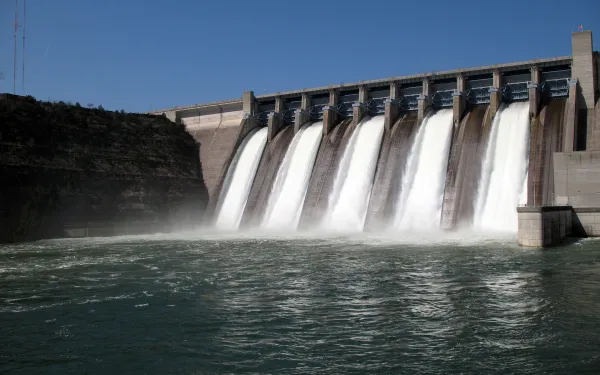
Letter: Concerning the Green Climate Fund and large hydropower
The 282 undersigned organizations write to express our significant concern regarding the use of GCF resources to support large hydropower, and, in particular, the following proposals in the GCF’s pipeline: (i) Qairokkum Hydropower Rehabilitation, Tajikistan; (ii) Upper Trishuli-1, Nepal; and (iii) Tina River Hydro Project, Solomon Islands. The GCF can and should help pay for the incremental costs of renewable energy sources, which are often less “bankable” (though less so all the time). However, we wish to highlight that large dams are different from wind, solar and other technologies because they fail to fulfill the GCF Investment Criteria. For example: (i) Impact potential: Dams emit significant amounts of greenhouse gases, particularly methane, and damage carbon sinks; (ii) Paradigm shift potential: Large hydro is a non-innovative technology that has not seen significant technical or financial breakthroughs in decades; (iii) Sustainable development: Dams have high negative co-impacts with regard to the environment, human rights, and economic cost. By interrupting rivers and flooding lands, they irreversibly harm livelihoods and ecosystems. Because they routinely cost double their estimates, large dams stretch government budgets and increase borrowing costs; (iv) Needs of the recipient: Hydropower projects are particularly vulnerable to climate change, and many countries are already alarmingly over-dependent on hydropower (as is the case with Tajikistan and Nepal). GCF should support efforts in these countries to diversify their energy mix, helping them improve their resilience and adaptive capacities; and, (v) Efficiency and effectiveness: Dams all over the world are losing generation capacity because of climate change-induced droughts. In addition, each of the dam-related projects in the GCF’s pipeline suffers significant deficiencies: Qairokkum Hydropower Rehabilitation: This funding proposal is expected at the April board meeting. The board should reject it. The project aims to extend the life of a Soviet-era dam, built in the 1950s. It is not innovative in any way, deepens Tajikistan’s already alarming overdependence on climate-vulnerable hydro, and fails to address critical environmental problems of the original dam, among other concerns. Upper Trishuli-1: Though not up for consideration at the April board meeting, Upper Trishuli has been in the project pipeline for many months and should be expeditiously removed from it. With more than 30 hydro projects either operating, in construction, or planned on the Trishuli River, the project would have no transformational impact. It faces severe climate and disaster risks, would deepen Nepal’s overdependence on climate-vulnerable hydro, and would have significant impacts on indigenous communities and the environment that have not been adequately studied or addressed. There is also no assessment of the project’s vulnerability to earthquakes, despite the area being highly seismic. Tina River Hydro Project: Expected at the April board meeting, this 15 MW project is intended to reduce the Solomon Islands’ reliance on imported diesel. The project does not include an assessment of climate vulnerability, threatens a world-class biodiversity hotspot, and is very costly. Meanwhile, Solomon Islands has considerable renewable energy potential that has not been sufficiently studied. These issues and others are detailed in a letter sent previously to the Board. Thank you for your attention to this most important matter. We look forward to working with you and the Secretariat to ensure that the GCF is a transformational institution of the highest social and environmental caliber. That cannot be accomplished if the GCF finances large hydropower.
Read more